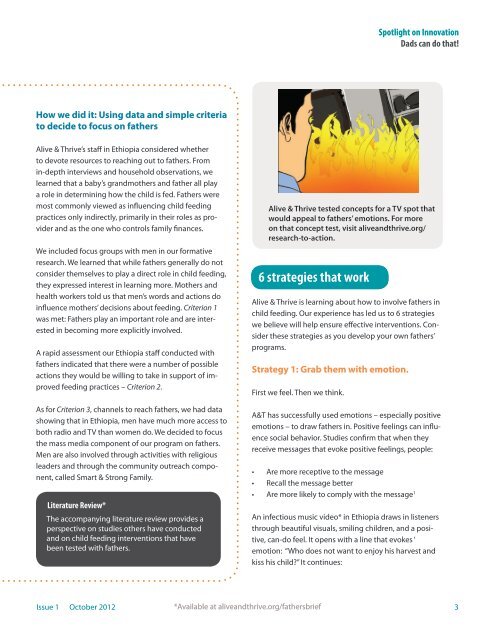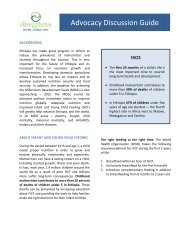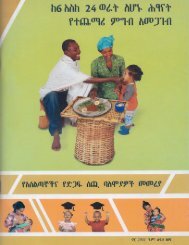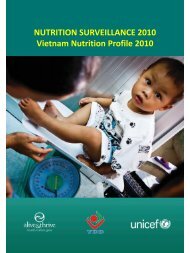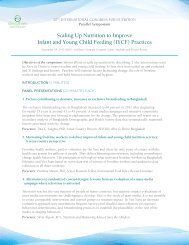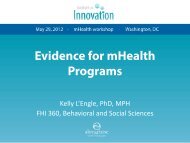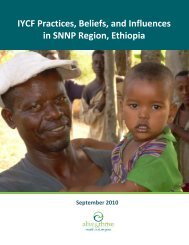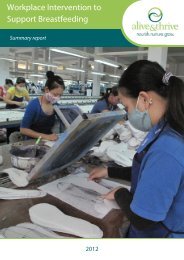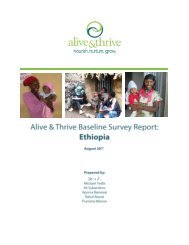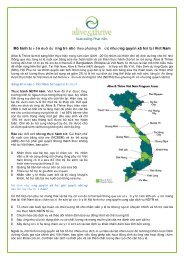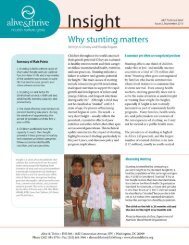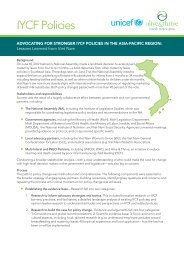Dads can do that! - Alive & Thrive
Dads can do that! - Alive & Thrive
Dads can do that! - Alive & Thrive
Create successful ePaper yourself
Turn your PDF publications into a flip-book with our unique Google optimized e-Paper software.
Spotlight on Innovation<strong>Dads</strong> <strong>can</strong> <strong>do</strong> <strong>that</strong>!How we did it: Using data and simple criteriato decide to focus on fathers<strong>Alive</strong> & <strong>Thrive</strong>’s staff in Ethiopia considered whetherto devote resources to reaching out to fathers. Fromin-depth interviews and household observations, welearned <strong>that</strong> a baby’s grandmothers and father all playa role in determining how the child is fed. Fathers weremost commonly viewed as influencing child feedingpractices only indirectly, primarily in their roles as providerand as the one who controls family finances.We included focus groups with men in our formativeresearch. We learned <strong>that</strong> while fathers generally <strong>do</strong> notconsider themselves to play a direct role in child feeding,they expressed interest in learning more. Mothers andhealth workers told us <strong>that</strong> men’s words and actions <strong>do</strong>influence mothers’ decisions about feeding. Criterion 1was met: Fathers play an important role and are interestedin becoming more explicitly involved.A rapid assessment our Ethiopia staff conducted withfathers indicated <strong>that</strong> there were a number of possibleactions they would be willing to take in support of improvedfeeding practices – Criterion 2.As for Criterion 3, channels to reach fathers, we had datashowing <strong>that</strong> in Ethiopia, men have much more access toboth radio and TV than women <strong>do</strong>. We decided to focusthe mass media component of our program on fathers.Men are also involved through activities with religiousleaders and through the community outreach component,called Smart & Strong Family.Literature Review*The accompanying literature review provides aperspective on studies others have conductedand on child feeding interventions <strong>that</strong> havebeen tested with fathers.<strong>Alive</strong> & <strong>Thrive</strong> tested concepts for a TV spot <strong>that</strong>would appeal to fathers’ emotions. For moreon <strong>that</strong> concept test, visit aliveandthrive.org/research-to-action.6 strategies <strong>that</strong> work<strong>Alive</strong> & <strong>Thrive</strong> is learning about how to involve fathers inchild feeding. Our experience has led us to 6 strategieswe believe will help ensure effective interventions. Considerthese strategies as you develop your own fathers’programs.Strategy 1: Grab them with emotion.First we feel. Then we think.A&T has successfully used emotions – especially positiveemotions – to draw fathers in. Positive feelings <strong>can</strong> influencesocial behavior. Studies confirm <strong>that</strong> when theyreceive messages <strong>that</strong> evoke positive feelings, people:• Are more receptive to the message• Recall the message better• Are more likely to comply with the message 1An infectious music video* in Ethiopia draws in listenersthrough beautiful visuals, smiling children, and a positive,<strong>can</strong>-<strong>do</strong> feel. It opens with a line <strong>that</strong> evokes ‘emotion: “Who <strong>do</strong>es not want to enjoy his harvest andkiss his child?” It continues:Issue 1 October 2012*Available at aliveandthrive.org/fathersbrief3


